英译汉练习
- 格式:doc
- 大小:75.00 KB
- 文档页数:12
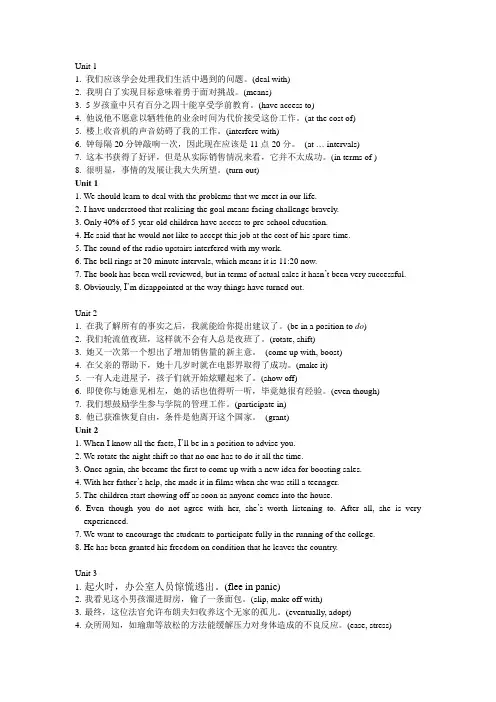
Unit 1 1. 我们应该学会处理我们生活中遇到的问题。(deal with) 2. 我明白了实现目标意味着勇于面对挑战。(means) 3. 5岁孩童中只有百分之四十能享受学前教育。(have access to) 4. 他说他不愿意以牺牲他的业余时间为代价接受这份工作。(at the cost of) 5. 楼上收音机的声音妨碍了我的工作。(interfere with) 6. 钟每隔20分钟敲响一次,因此现在应该是11点20分。 (at … intervals) 7. 这本书获得了好评,但是从实际销售情况来看,它并不太成功。(in terms of ) 8. 很明显,事情的发展让我大失所望。(turn out) Unit 1 1. We should learn to deal with the problems that we meet in our life. 2. I have understood that realizing the goal means facing challenge bravely. 3. Only 40% of 5-year-old children have access to pre-school education. 4. He said that he would not like to accept this job at the cost of his spare time. 5. The sound of the radio upstairs interfered with my work. 6. The bell rings at 20-minute intervals, which means it is 11:20 now. 7. The book has been well reviewed, but in terms of actual sales it hasn’t been very successful. 8. Obviously, I’m disappointed at the way things have turned out.
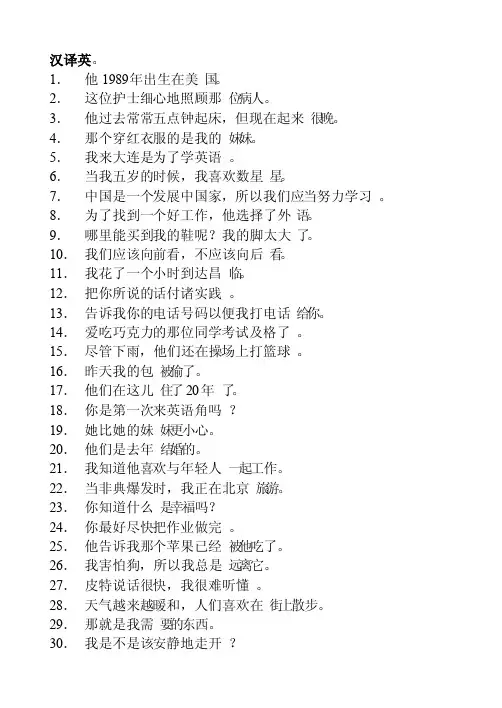
汉译英。
1.他1989年出生在美国。
2.这位护士细心地照顾那位病人。
3.他过去常常五点钟起床,但现在起来很晚。
4.那个穿红衣服的是我的妹妹。
5.我来大连是为了学英语。
6.当我五岁的时候,我喜欢数星星。
7.中国是一个发展中国家,所以我们应当努力学习。
8.为了找到一个好工作,他选择了外语。
9.哪里能买到我的鞋呢?我的脚太大了。
10.我们应该向前看,不应该向后看。
11.我花了一个小时到达昌临。
12.把你所说的话付诸实践。
13.告诉我你的电话号码以便我打电话给你。
14.爱吃巧克力的那位同学考试及格了。
15.尽管下雨,他们还在操场上打篮球。
16.昨天我的包被偷了。
17.他们在这儿住了20年了。
18.你是第一次来英语角吗?19.她比她的妹妹更小心。
20.他们是去年结婚的。
21.我知道他喜欢与年轻人一起工作。
22.当非典爆发时,我正在北京旅游。
23.你知道什么是幸福吗?24.你最好尽快把作业做完。
25.他告诉我那个苹果已经被他吃了。
26.我害怕狗,所以我总是远离它。
27.皮特说话很快,我很难听懂。
28.天气越来越暖和,人们喜欢在街上散步。
29.那就是我需要的东西。
30.我是不是该安静地走开?31.你花了多少时间完成你的作业?32.我们应该保持宿舍干净。
33.他好像有很多车。
34.你正是我要找的人。
35.大声点说话以便大家都能听见。
36.既然天黑了,你介意呆在这儿吗?37.尽管我们失败了,但至少我们也尽力了。
38.房子太贵了,我买不起。
39.他将照我说的做。
40.金钱不能带来幸福和爱情。
41.当她穿上那件裙子,她看上去年轻了。
42.我害怕晚上出门。
43.当妈妈进卧室的时候,爸爸假装在看报纸。
44.他被人看作世界上最好的篮球运动员。
45.我们不应该嘲笑她,因为我们也有缺点。
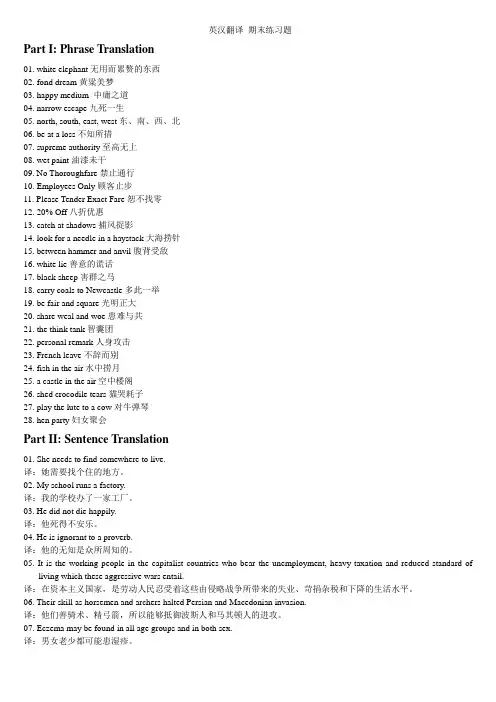
英汉翻译期末练习题Part I: Phrase Translation01. white elephant无用而累赘的东西02. fond dream黄粱美梦03. happy medium 中庸之道04. narrow escape九死一生05. north, south, east, west东、南、西、北06. be at a loss不知所措07. supreme authority至高无上08. wet paint油漆未干09. No Thoroughfare禁止通行10. Employees Only顾客止步11. Please Tender Exact Fare恕不找零12. 20% Off八折优惠13. catch at shadows捕风捉影14. look for a needle in a haystack大海捞针15. between hammer and anvil腹背受敌16. white lie善意的谎话17. black sheep害群之马18. carry coals to Newcastle多此一举19. be fair and square光明正大20. share weal and woe患难与共21. the think tank智囊团22. personal remark人身攻击23. French leave不辞而别24. fish in the air水中捞月25. a castle in the air空中楼阁26. shed crocodile tears猫哭耗子27. play the lute to a cow对牛弹琴28. hen party妇女聚会Part II: Sentence Translation01. She needs to find somewhere to live.译:她需要找个住的地方。
02. My school runs a factory.译:我的学校办了一家工厂。
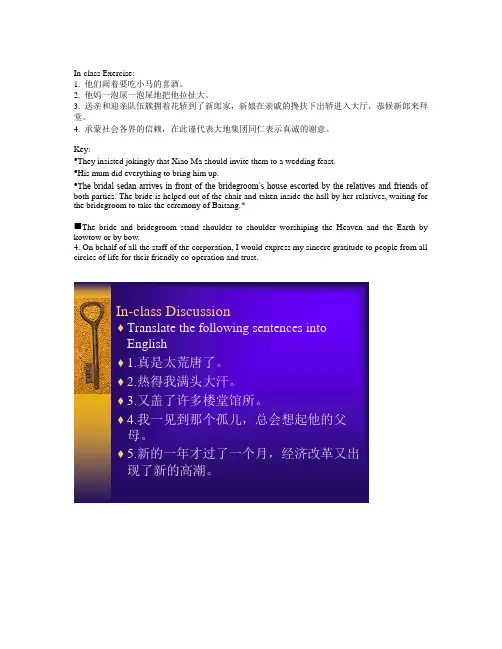
In-class Exercise:1. 他们闹着要吃小马的喜酒。
2. 他妈一泡尿一泡屎地把他拉扯大。
3. 送亲和迎亲队伍簇拥着花轿到了新郎家,新娘在亲戚的搀扶下出轿进入大厅,恭候新郎来拜堂。
4. 承蒙社会各界的信赖,在此谨代表大地集团同仁表示真诚的谢意。
Key:•They insisted jokingly that Xiao Ma should invite them to a wedding feast.•His mum did everything to bring him up.•T he bridal sedan arrives in front of the bridegroom’s house escorted by the relatives and friends of both parties. The bride is helped out of the chair and taken inside the hall by her relatives, waiting for the bridegroom to take the ceremony of Baitang.*The bride and bridegroom stand shoulder to shoulder worshiping the Heaven and the Earth by kowtow or by bow.4. On behalf of all the staff of the corporation, I would express my sincere gratitude to people from all circles of life for their friendly co-operation and trust.In-class Practice:Translate the following into English, paying special attention to the choice ofthe predicate for each sentence1.东湖里的鱼很多。

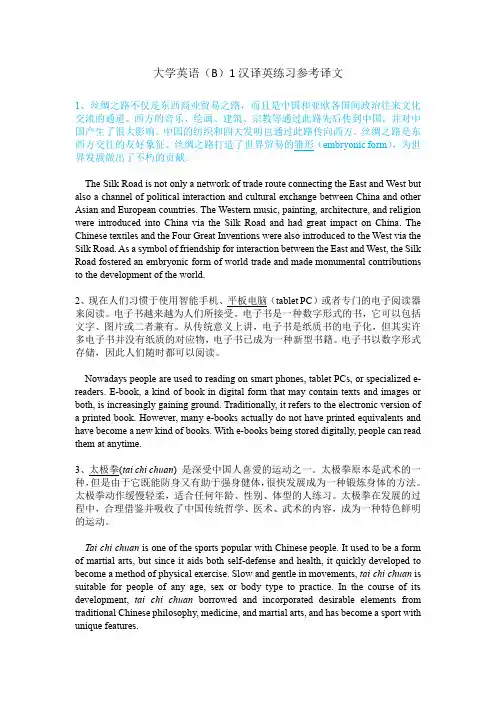
大学英语(B)1汉译英练习参考译文1、丝绸之路不仅是东西商业贸易之路,而且是中国和亚欧各国间政治往来文化交流的通道。
西方的音乐、绘画、建筑、宗教等通过此路先后传到中国,并对中国产生了很大影响。
中国的纺织和四大发明也通过此路传向西方。
丝绸之路是东西方交往的友好象征。
丝绸之路打造了世界贸易的雏形(embryonic form),为世界发展做出了不朽的贡献。
The Silk Road is not only a network of trade route connecting the East and West but also a channel of political interaction and cultural exchange between China and other Asian and European countries. The Western music, painting, architecture, and religion were introduced into China via the Silk Road and had great impact on China. The Chinese textiles and the Four Great Inventions were also introduced to the West via the Silk Road. As a symbol of friendship for interaction between the East and West, the Silk Road fostered an embryonic form of world trade and made monumental contributions to the development of the world.2、现在人们习惯于使用智能手机、平板电脑(tablet PC)或者专门的电子阅读器来阅读。
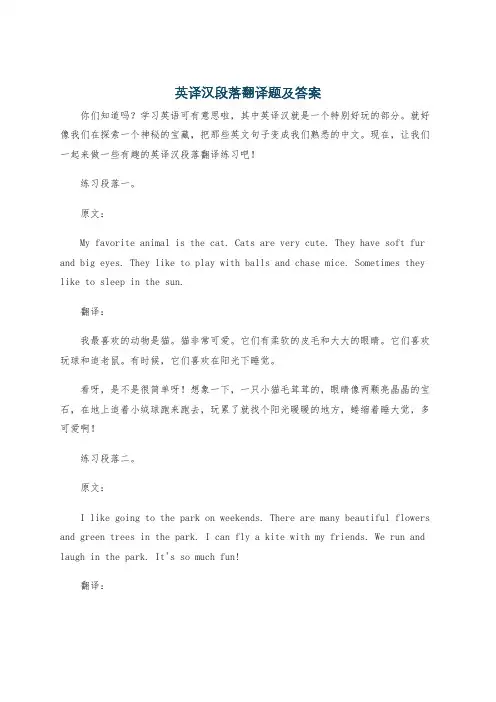
英译汉段落翻译题及答案你们知道吗?学习英语可有意思啦,其中英译汉就是一个特别好玩的部分。
就好像我们在探索一个神秘的宝藏,把那些英文句子变成我们熟悉的中文。
现在,让我们一起来做一些有趣的英译汉段落翻译练习吧!练习段落一。
原文:My favorite animal is the cat. Cats are very cute. They have soft fur and big eyes. They like to play with balls and chase mice. Sometimes they like to sleep in the sun.翻译:我最喜欢的动物是猫。
猫非常可爱。
它们有柔软的皮毛和大大的眼睛。
它们喜欢玩球和追老鼠。
有时候,它们喜欢在阳光下睡觉。
看呀,是不是很简单呀!想象一下,一只小猫毛茸茸的,眼睛像两颗亮晶晶的宝石,在地上追着小绒球跑来跑去,玩累了就找个阳光暖暖的地方,蜷缩着睡大觉,多可爱啊!练习段落二。
原文:I like going to the park on weekends. There are many beautiful flowers and green trees in the park. I can fly a kite with my friends. We run and laugh in the park. It's so much fun!翻译:我喜欢在周末去公园。
公园里有许多美丽的花朵和翠绿的树木。
我可以和我的朋友们一起放风筝。
我们在公园里奔跑、欢笑。
真是太有趣啦!想想看,周末的时候,阳光明媚,你和小伙伴们一起去公园,五颜六色的花就像给大地穿上了漂亮的衣裳,大树就像一把把绿色的大伞。
你们在草地上欢快地跑着,风筝在天空中高高地飞着,大家的笑声在公园里回荡,多开心呀!练习段落三。
原文:My family has three people. They are my father, my mother and me. My father is a doctor. He helps sick people. My mother is a teacher. She teaches students. I love my family very much.翻译:我家有三口人。
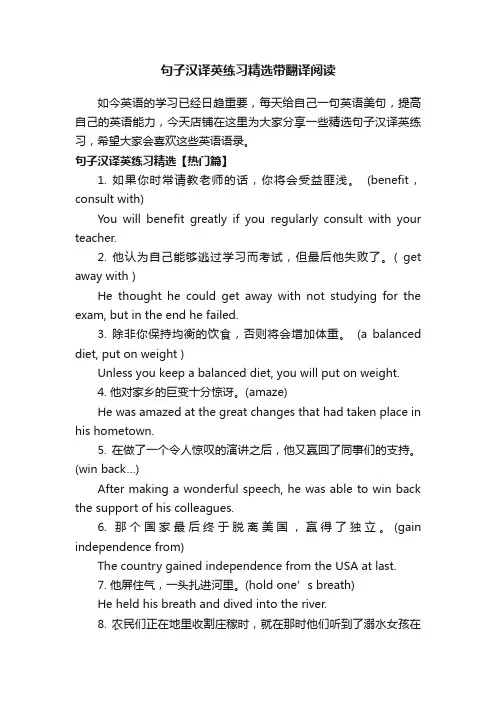
句子汉译英练习精选带翻译阅读如今英语的学习已经日趋重要,每天给自己一句英语美句,提高自己的英语能力,今天店铺在这里为大家分享一些精选句子汉译英练习,希望大家会喜欢这些英语语录。
句子汉译英练习精选【热门篇】1. 如果你时常请教老师的话,你将会受益匪浅。
(benefit,consult with)You will benefit greatly if you regularly consult with your teacher.2. 他认为自己能够逃过学习而考试,但最后他失败了。
( get away with )He thought he could get away with not studying for the exam, but in the end he failed.3. 除非你保持均衡的饮食,否则将会增加体重。
(a balanced diet, put on weight )Unless you keep a balanced diet, you will put on weight.4. 他对家乡的巨变十分惊讶。
(amaze)He was amazed at the great changes that had taken place in his hometown.5. 在做了一个令人惊叹的演讲之后,他又赢回了同事们的支持。
(win back…)After making a wonderful speech, he was able to win back the support of his colleagues.6. 那个国家最后终于脱离美国,赢得了独立。
(gain independence from)The country gained independence from the USA at last.7. 他屏住气,一头扎进河里。
(hold one’s breath)He held his breath and dived into the river.8. 农民们正在地里收割庄稼时,就在那时他们听到了溺水女孩在呼救。
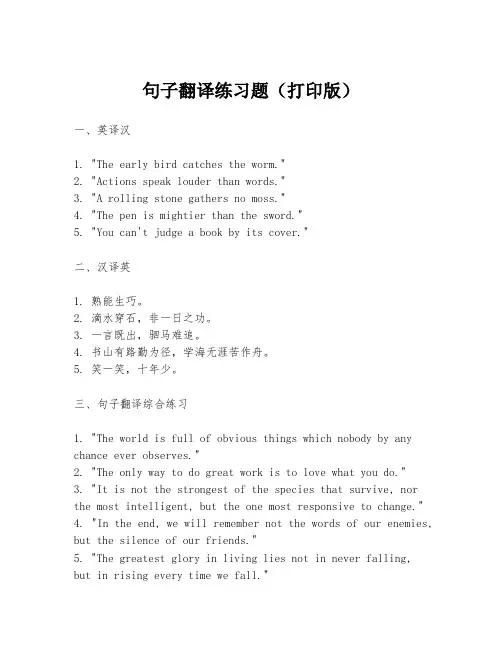
句子翻译练习题(打印版)一、英译汉1. "The early bird catches the worm."2. "Actions speak louder than words."3. "A rolling stone gathers no moss."4. "The pen is mightier than the sword."5. "You can't judge a book by its cover."二、汉译英1. 熟能生巧。
2. 滴水穿石,非一日之功。
3. 一言既出,驷马难追。
4. 书山有路勤为径,学海无涯苦作舟。
5. 笑一笑,十年少。
三、句子翻译综合练习1. "The world is full of obvious things which nobody by any chance ever observes."2. "The only way to do great work is to love what you do."3. "It is not the strongest of the species that survive, nor the most intelligent, but the one most responsive to change."4. "In the end, we will remember not the words of our enemies, but the silence of our friends."5. "The greatest glory in living lies not in never falling,but in rising every time we fall."四、成语翻译1. 画蛇添足2. 亡羊补牢3. 掩耳盗铃4. 杯弓蛇影5. 井底之蛙五、段落翻译英译汉"In a world where you can be anything, be kind. It's a simple act, yet it can change someone's day for the better. Kindness is a language that the deaf can hear and the blind can see."汉译英"在这个世界上,你可以成为任何人。
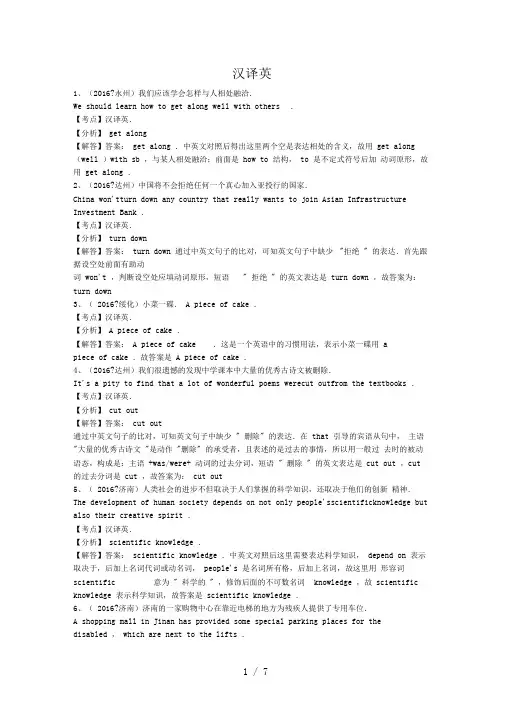
汉译英1、(2016?永州)我们应该学会怎样与人相处融洽.We should learn how to get along well with others .【考点】汉译英.【分析】get along【解答】答案:get along .中英文对照后得出这里两个空是表达相处的含义,故用get along (well )with sb ,与某人相处融洽;前面是how to 结构,to 是不定式符号后加动词原形,故用get along .2、(2016?达州)中国将不会拒绝任何一个真心加入亚投行的国家.China won'tturn down any country that really wants to join Asian Infrastructure Investment Bank .【考点】汉译英.【分析】turn down【解答】答案:turn down 通过中英文句子的比对,可知英文句子中缺少"拒绝" 的表达.首先跟据设空处前面有助动词won't ,判断设空处应填动词原形,短语" 拒绝" 的英文表达是turn down ,故答案为:turn down3、(2016?绥化)小菜一碟.A piece of cake .【考点】汉译英.【分析】A piece of cake .【解答】答案:A piece of cake .这是一个英语中的习惯用法,表示小菜一碟用apiece of cake .故答案是A piece of cake .4、(2016?达州)我们很遗憾的发现中学课本中大量的优秀古诗文被删除.It's a pity to find that a lot of wonderful poems werecut outfrom the textbooks .【考点】汉译英.【分析】cut out【解答】答案:cut out通过中英文句子的比对,可知英文句子中缺少" 删除" 的表达.在that 引导的宾语从句中,主语"大量的优秀古诗文"是动作"删除" 的承受者,且表述的是过去的事情,所以用一般过去时的被动语态,构成是:主语+was/were+ 动词的过去分词,短语" 删除" 的英文表达是cut out ,cut 的过去分词是cut ,故答案为:cut out5、(2016?济南)人类社会的进步不但取决于人们掌握的科学知识,还取决于他们的创新精神.The development of human society depends on not only people'sscientificknowledge but also their creative spirit .【考点】汉译英.【分析】scientific knowledge .【解答】答案:scientific knowledge .中英文对照后这里需要表达科学知识,depend on 表示取决于,后加上名词代词或动名词,people's 是名词所有格,后加上名词,故这里用形容词scientific 意为" 科学的" ,修饰后面的不可数名词knowledge ,故scientific knowledge 表示科学知识,故答案是scientific knowledge .6、(2016?济南)济南的一家购物中心在靠近电梯的地方为残疾人提供了专用车位.A shopping mall in Jinan has provided some special parking places for thedisabled ,which are next to the lifts .【考点】汉译英.【分析】provoded ,next .【解答】答案:provoded ,next .结合句意要表达出提供某些物给某人;结合后面的介词for 用provide sth .for sb .这里的提供这个动作发生在过去,对现在造成一定的影响,故用现在完成时have/has+ 过去分词,provide 的过去分词provided ,空格二说的是靠近结合介词to ,用next to .故答案是provoded ,next .7、(2016?济南)小孩子不应该看太多电视.Little children shouldn't watch TV too much .【考点】汉译英.【分析】watch TV .【解答】答案.watch TV .结合句意是要表达出看电视用短语watch TV .前面有情态动词should ,后加动词原形,故答案是watch TV .8、(2016?恩施州)他看上去与我想象的不一样.He looked different from what I'd expected .【考点】汉译英.【分析】different from .【解答】答案:different from .结合句意是需要表达与…不一样,结合前面的look是系动词,后加上形容词different 不同的构成系表结构,加上介词from ,故答案是different from9、(2016?恩施州)在餐馆里拿食物的时候不要拿超过你需要的量.Don't take more food than you need in the restaurant ‘ 【考点】汉译英.【分析】more. than .【解答】答案:more. than .结合句意是说没必要拿比你需要的量多的食物,是两者之间的比较用比较级,food是不可数名词食物,用much的比较级more,后加上than,故答案是more. Than10、(2016?恩施州)多亏中国的好政策,那个贫困家庭过上了幸福的生活.Thanks to the good policy in China ,the poor family has lived a happy life . 【考点】汉译英.【分析】Thanks to .【解答】答案:Thanks to .结合中英文是要译出多亏,用thanks to ,to 是介词,后加感谢的对象,故答案是Thanks to .11、(2016?恩施州)因为水严重受到污染,所以池塘里的鱼死光了.The fish in the pond have died out because the water was polluted seriously . 【考点】汉译英.【分析】died out【解答】答案:died out通过中英文句子的比对,可知英文句子中缺少"死光"的表达.短语"死光"的英文表达是die out ,根据汉语表述结合设空处前面的助动词have 判断主句用的是现在完成时,现在完成时的构成是:主语+have/has+ 动词的过去分词;die 的过去分词是died ,故答案是:died out12、(2016?恩施州)暑假期间我父母将带我去参观恩施高中.My parents will take/show me around Enshi High School during the summer holidays .【考点】汉译英.【分析】take/show ;around【解答】答案:take/show ;around 通过中英文句子的比对,可知英文句子中缺少" 带某人参观某地"的表达.短语" 带某人参观某地"的英文表达是:take/show sb .around sp ,本题结合句意和设空处前面有助动词will ,判断谓语动词用一般将来时,一般将来时的构成是:主语+will+ 动词原形,所以答案是:take/show ;around13、(2016?陕西)没有知识,你成功的可能性就会小一些.Without knowledge ,you may have little chance to achieve success .【考点】汉译英.【分析】knowledge .【解答】答案:knowledge .表示没有知识,结合所给的without是介词,表示除了…,没有…后加名词代词或动名词,这里是名词知识kno wledge为不可数名词,故答案是knowledge .14、(2016?济南)无论天气怎样,清洁工们总是按时清扫街道.However the weather is ,the cleaners always clean up the streets on time .【考点】汉译英.【分析】on time .【解答】答案. on time .结合句意这里需要表达按时,用短语on tome ,在句中做状语,故答案是on tome15、(2016?淮安)TFBOYS勺这首新歌很流行,我们大部分人都认为它值得一听.The new song by TFBOYS is so popular that most of us think it isworth listening to . 【考点】汉译英.【分析】so popular ;worth listening to【解答】答案:so popular ;worth listening to .结合句意是说歌曲是如此流行以至于人们认为值得听,表示如此…以至于…用so/such…that ,这里是形容词popular流行的,故用so popular ,表示值得做某事用be worth doing sth ,听歌listen to ,故worth listening to ,故答案是so popular ;worth listening to .16、(2016?随州)她对自己要求非常严格.She is verystrictwithherself .【考点】汉译英.【分析】strict with .【解答】答案:strict with .结合句意是说对某人严格用be strict with sb ,故答案是strict with .17、(2016?随州)休闲活动是人们用以轻松和自娱的活动.Leisure activities are the kinds of things people like to doto relaxand enjoythemselves .【考点】汉译英.【分析】to relax ,themselves .【解答】答案:to relax ,themselves .结合句意和句子结构,这里people like to do 是定语从句,修饰things ,这里是说休闲运动是用来轻松和自娱的,用动词不定式to do 做目的状语,放松relax ,自娱enjoy oneself ,结合people 用反身代词themselves ,故答案是to relax ,themselves18、(2016?淮安)戴安娜已经离开家乡十年了,她希望尽快回来.Dianahas been away from her hometown for ten years and she hopes to come backas soon as possible .【考点】汉译英.【分析】has been away from ,as soon as .【解答】答案:has been away from ,as soon as .结合句意可知离开leave 的动作发生在过去,持续了一段时间用现在完成时have/has+ 过去分词,主语为单数故用has ,这里的leave 是短暂性动词,不能和一段时间for ten years 连用,需换成be away from ,be 的过去分词been, 及has been away from ; 表示尽快结合后面的possible 用as soon as possible ,故答案是has been away from ,as soon as .19、(2016?淮安)那辆大卡车突然失去控制,它停下来后占据了马路的三分之一.That big truck was out of control suddenly .It took up one third of the road after it stopped .【考点】汉译英.【分析】out of control ; took up .【解答】答案:out of control , took up .表示失去控制用短语out of control .空格二要求译出占据用短语take up ,这里是说过去的事情用一般过去时, take 的过去式took ,故答案是out of control , took up .20、(2016?淮安)我的弟弟有足够的耐心,他等半小时也不会生气.My brother is patient enough to wait for half an hour without being angry .【考点】汉译英.【分析】patient enough ; being angry【解答】答案:patient enough ; being angry .表示足够怎样去做某事结合后面的动词不定式to wait 用形容词或副词+enough to do sth ,这里是用形容词patient 有耐心的.without 是介词,表示没有…,后加名词代词动名词,这里用动名词being (be)angry 生气,表达状态.故答案是patient enough ; being angry .21、(2016?淮安)他的叔叔习惯每天早饭后去散步.His uncle gets used to going out for a walk after breakfast every day .【考点】汉译英.【分析】used to , after breakfast .【解答】答案:used to , after breakfast .表示习惯于做某事结合后面的动名词going 用be/get used to doing ,空格二表示早饭后after breakfast ,故答案是used to , after breakfast .22、(2016?丹东)在字典中查阅新单词是个好习惯.It's a good habit to look up the new words in a dictionary .【考点】汉译英.【分析】to look up【解答】答案:to look up .首先通过中英文句子的比对,可知英文句子中缺少"查阅"的表达.短语"查阅"的英文表达是:look up .本题中,从整体结构来看,句子所使用的句式是:It's+ 名词+to do ,所以设空处应填动词不定式, it 作形式主语,动词不定式为真正主语.故答案为:to look up23、(2016?丹东)过去我们学校周围有许多树.There used to be many trees around our school .【考点】汉译英.【分析】used to be【解答】答案:used to be .首先通过中英文句子的比对,可知英文句子中缺少”过去有”的表达.短语”过去…"的英文表达是:used to .本题中,从整体结构来看,句子所使用的句式是:There be+ 名词+地点,表示" 某地有某物" ,表示" 过去有… " 则用There used to be+ 名词,故答案为:usedto be24、(2016?丹东)刚才谁想出的这个好主意?Who came up with/thought of the good idea just now ?【考点】汉译英.【分析】came up with/thought of【解答】答案:came up with/thought of .首先通过中英文句子的比对,可知英文句子中缺少"想出"的表达.短语"想出"的英文表达是:come up with 或think of .本题中,时间状语是just now (刚才),所以句子用一般过去时,所填动词用过去式,故答案为:came up with/thought of .25、(2016?丹东)他年龄够大了,可以上学了. He is old enough to go to school . 【考点】汉译英.【分析】He is old enough to go to school .【解答】答案:He is old enough to go to school .结合句意这里是说客观事实用一般现在时,表示足够怎样去做某事用形容词/ 副词+enough to do sth ,主语是he 三单,故is ,年龄大的用形容词old ,上学go to school ,故答案是He is old enough to go to school .26、(2016?丹东)请遵守学校的规章制度. Please follow the school rules【考点】汉译英.【分析】Please follow the school rules .【解答】答案:Please follow the school rules .这里是祈使句,please 表示请,后加动词原形,表示遵守学校规章follow the school rules .故答案是Please follow the school rules .27 、(2016? 丹东)你能告诉我他怎么了?Could you tell me what's wrong with him?.【考点】汉译英.【分析】Could you tell me what's wrong with him ?【解答】答案:Could you tell me what's wrong with him ?结合句意这里是提出请求用could you do sth ?你能做某事吗?告诉我他怎么了说的是客观事实用一般现在时,告诉我tell me ,故Could you tell me ,后加宾语从句what's wrong with him 他怎么了,what 是主语,故语序不变,故答案是Could you tell me what's wrong with him ?28、(2016?丹东)这个足球属于我. This soccer belongs to me ..【考点】汉译英.【分析】This soccer belongs to me .【解答】答案:This soccer belongs to me .这里是说客观事实用一般现在时,表示属于某人用belong to , to 是介词,后加上宾格me 主语是this soccer 三单,故belongs ,故答案是This soccer belongs to me29、(2016?丹东)大连的天气与丹东的天气一样凉爽吗?Is the weather in Dalianas cool asthat in Dandong ?【考点】汉译英.【分析】 as cool as .【解答】答案:as cool as .结合句意是说一样…用 as …as ,中间用形容词或副词原级,这里是说凉爽,与前面的 is 构成系表结构,用形容词 cool 凉爽的,故答案是 as cool as . 30、( 2016?丹东)据我所知,汤姆已离开两周了.As far as I know , Tomhas been away for two weeks .【考点】汉译英.【分析】 has been away .【解答】答案: has been away .结合句意离开这个动作发生在过去,已经持续了一段时 间,故用现在完成时 have/has+ 过去分词,离开 leave 是短暂性动词,不能与一段时间 for two weeks 连用,换成 be away ,主语是 Tom 三单,故 has , be 的过去分词 been ,故答案 是 has been away . 31、( 2016?丹东)如果明天不下雨,我的家人将去野餐.If it doesn't rain tomorrow , my family will go for a picnic .【考点】汉译英.【分析】 If it doesn't rain tomorrow .【解答】答案: If it doesn't rain tomorrow .结合句意这里是用 if 引导的条件状语从 句, if 表示如果,遵循主将从现的规则,表示明天不下雨用否定句 it doesn't rain tomorrow 故答案是 If it doesn't rain tomorrow .32、( 2016?丹东)到上英语课的时间了! It's time for English class ..【考点】汉译英.for English class .33、( 2016?陕西)聚会结束时我唱了一首歌.I sang a song at the end of the party 【考点】汉译英.【分析】 sang a song . 【解答】答案: sang a song .这里是说过去的事情用一般过去时,表示唱了一首歌用sing a song ,sing 动词唱歌,其过去式是 sang ,故答案是 sang a song34、( 2016?陕西)窗户旁边有一架钢琴.There is a pianobeside the window .【考点】汉译英.【分析】 beside the window .【解答】答案: beside the window .这里是要译出再窗户旁边,用介词 beside 表示在… 旁边,后加名词 the window (指定了窗户,故用 the 表特指),故答案是 beside the window .35、( 2016?陕西)我想邀请他参加我们的俱乐部.I wantto invite him to join our club .【考点】汉译英.【分析】 to invite him .【解答】答案: to invite him .表示想要做某事用 want to do sth ,表示邀请某人去做 某事用 invite sb to do sth ,这里用宾格 him 他,故答案是 to invite him .36、( 2016?十堰)在我看来,似乎如今的孩子们更加依赖他们的父母了.It seems to me that kids today depend more on their parents . 【考点】汉译英.【分析】 It's time for Englishclass 【解答】答案: It's time forEnglish class 某事的时间了用句型 it's.这里是说客观事实用一般现在时,表示做 .英语课 English class ,故答案是 It's time【分析】depend more on .【解答】答案:depend more on .这里是说客观事实用一般现在时,表示依靠依赖某人用depend on sb,主语是the kids 复数,much表示程度多修饰depend,用其比较级more表示更多,故答案是depend more on .37、(2016?十堰)现在在十堰,大多数司机习惯了在斑马线前停下来等行人先行.There days ,most driversare used to stoppingto wait for people to cross the road first at the zabra crossing in Shiyan .【考点】汉译英.【分析】are used to stopping .【解答】答案:are used to stopping .这里是说客观事实用一般现在时,表示习惯于做某事用be used to doing sth ,主语是most drivers 复数,故are ,表示停下来做某事用stop to do sth ,stop 的动名词stopping ,故答案是are used to stopping .38、(2016?兰州)我们的未来多么光明!Howbrightour future is !【考点】汉译英.【分析】How bright .【解答】答案:How bright .英语中的感叹句要由what和how来引导,其句型是:How+形容词/副词+主语+谓语+其他!What+ (a/an )+形容词+名词+主语+谓语+其他!根据所给的单词,形容词是bright ,主语是our future ,应用how来感叹,故填写:How bright39、(2016?随州)这些年她一直坚持晨跑.She has stuck to running in the morning all the years .【考点】汉译英.【分析】stuck running .【解答】答案:stuck running .结合句意坚持这个动作发生在过去,持续到现在,故用现在完成时have/has+ 过去分词,坚持做某事stick to doing sth ,stick 的过去分词是stuck ,跑步run 的动名词running ,故答案是stuck running .40、(2016?随州)对世界各地的年轻人来说,这些服装是最受青睐的.The are the most popular choice of clothing for young people around the world .【考点】汉译英.【分析】most popular .【解答】答案:most popular .结合句意是说最受青睐的用最高级,popular 形容词最受欢迎的,最高级是加上most,故答案是most popular .。
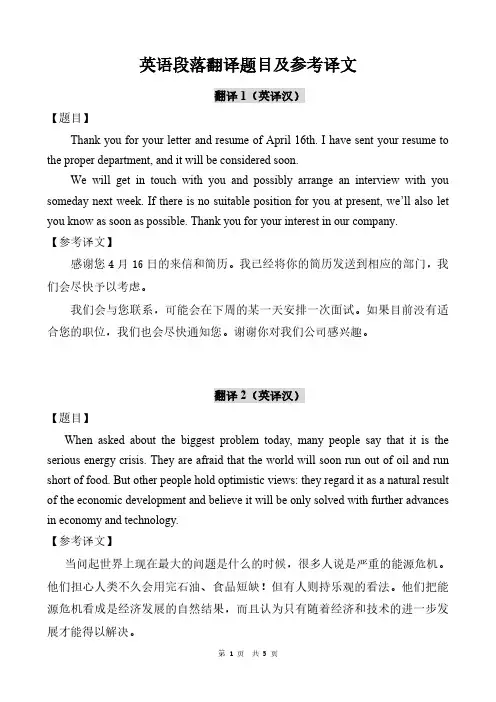
英语段落翻译题目及参考译文翻译1(英译汉)【题目】Thank you for your letter and resume of April16th.I have sent your resume to the proper department,and it will be considered soon.We will get in touch with you and possibly arrange an interview with you someday next week.If there is no suitable position for you at present,we’ll also let you know as soon as possible.Thank you for your interest in our company.【参考译文】感谢您4月16日的来信和简历。
我已经将你的简历发送到相应的部门,我们会尽快予以考虑。
我们会与您联系,可能会在下周的某一天安排一次面试。
如果目前没有适合您的职位,我们也会尽快通知您。
谢谢你对我们公司感兴趣。
翻译2(英译汉)【题目】When asked about the biggest problem today,many people say that it is the serious energy crisis.They are afraid that the world will soon run out of oil and run short of food.But other people hold optimistic views:they regard it as a natural result of the economic development and believe it will be only solved with further advances in economy and technology.【参考译文】当问起世界上现在最大的问题是什么的时候,很多人说是严重的能源危机。
英语中译英练习题1. 将下列句子从中文翻译成英文:- 他每天都会去图书馆。
- 她喜欢在公园里散步。
- 孩子们正在学习新的语言。
2. 翻译以下短语:- 春节- 网络购物- 环境保护3. 将下列对话翻译成英文:- A: 你今天过得怎么样?B: 很好,谢谢。
你呢?- A: 我今天很忙,但我完成了所有的工作。
B: 那太好了,希望你晚上能好好休息。
4. 翻译以下句子,注意时态和语态:- 这个项目将在下个月开始。
- 那本书已经被我读完了。
- 这些照片明天将被寄出去。
5. 将下列段落翻译成英文:- 随着科技的发展,我们的生活变得越来越便利。
现在,我们可以通过智能手机完成许多任务,比如在线购物、支付账单、甚至远程工作。
6. 翻译以下谚语或成语:- 滴水穿石。
- 一石二鸟。
- 亡羊补牢,未为晚也。
7. 将下列指示性句子翻译成英文:- 请把这本书放在书架上。
- 请在离开房间前关灯。
- 请在表格上填写你的个人信息。
8. 翻译以下含有复杂结构的句子:- 尽管他很努力,但他还是没有通过考试。
- 她不仅是一位优秀的教师,还是一位伟大的母亲。
- 如果明天下雨,我们将取消野餐计划。
9. 将下列段落翻译成英文,并注意保持原意:- 在中国,春节是最重要的传统节日之一。
人们会聚在一起吃年夜饭,放烟花,给孩子们压岁钱。
10. 翻译以下含有专业术语的句子:- 这个软件包包含了许多有用的工具,可以提高你的工作效率。
- 医生建议病人采取低盐饮食以降低血压。
- 这个新发现的化石为古生物学家提供了宝贵的信息。
《英汉翻译》考试练习题及答案一、填空题1. 严复在《天演论•译例言》中提出“译事三难”的三字标准:“译事三难:()。
求其信已大难矣!顾信矣不达,虽译犹不译也,则达尚焉。
”严复的“三字标准”涵盖翻译方法、翻译过程、翻译效果等堪称一个翻译理论体系。
答案:信、达、雅2. 1964年,奈达博士在《翻译科学初探》Toward a Science of Translation 一书中针对"形式对等(Functional Equivalence)翻译";提出了()" 翻译".答案:动态对等(Dynamic Equivalence)3. 一般认为,翻译过程包括两个阶段:正确理解(accurate comprehension)和().答案:充分表达(adequate representation)二、成语解释1.pull one’s leg答案:开玩笑,戏弄某人2. castle in the air答案:空中楼阁3.eat one’s words答案:收回前言(承认说错)4. to teach a pig to play on a flute答案:教猪吹笛5. have an axe to grind答案:别有用心6.a bolt from the blue答案:晴天霹雳7. Walls have ears.答案:隔墙有耳8. In the country of the blind, the one-eyed man is King.答案:盲人国里,独眼人称王9. Like father, like son.答案:有其父必有其子三、英译汉1.A Fiat slowly nosed its way out into the fast lane.答案:一辆“菲亚特”慢慢离开慢车道,驶进快车道。
2. If you try to cover up your misdeed with a fig leaf, you’ll only make it more conspicuous.答案:你要是想用遮羞布掩盖你的罪行,那只能是欲盖弥彰。
高中英汉互译练习题及讲解一、英译汉练习1. 练习题: "The rapid development of technology has brought about profound changes in our daily lives."答案:技术快速发展已经给我们的日常生活带来了深刻的变化。
2. 练习题: "The novel 'Pride and Prejudice' is considered a classic in English literature."答案:小说《傲慢与偏见》被认为是英国文学中的经典之作。
3. 练习题: "The government has taken measures to reduce the impact of pollution on the environment."答案:政府已经采取了措施来减少污染对环境的影响。
4. 练习题: "Despite the heavy rain, the marathon was still held as scheduled."答案:尽管下着大雨,马拉松比赛还是如期举行了。
5. 练习题: "The concept of 'sustainable development' is becoming increasingly important in today's society."答案:“可持续发展”的概念在当今社会变得越来越重要。
二、汉译英练习1. 练习题:我们应当尊重每个人的文化背景和价值观。
答案: We should respect everyone's cultural background and values.2. 练习题:随着科技的进步,远程工作变得越来越普遍。
答案: With the advancement of technology, remote work is becoming more and more common.3. 练习题:他不仅是一位杰出的科学家,也是一位受人尊敬的教育家。
1 Exercise 1 Adidas Sports Shoes Over twenty-eight years ago, adidas gave birth to a new idea in sports shoes. And the people who wear our shoes have been running and winning ever since. In fact, adidas has helped them set over 400 world records in track and field alone. Maybe that’s why more and more football, soccer, basketball, baseball and tennis players are turning to adidas. They know that, whatever their game, they can rely on adidas workmanship and quality in every product we make. So whether you are pounding the roads on a marathon, or just jogging around the block, adidas shall be on your feet. You were born to run. And we were born to help you do it better. You’ll find us anywhere smart sports people buy their shoes. Adidas, the all sports people.
Petal-Drops For the girl who wants a petal-soft skin With Petal-Drops Moisturizing Bath-Essence you can give your skin a petal-fresh softness and fragrance that will last and last the whole day through. All sorts of oils, delicately perfumed herbal essences and the gentlest of toning agents---all combined with our loving care to give that oh-so-good-to-be-alive feeling. Relax. Petal-Drops your way to a smooth, silky skin. Choose from two exciting fragrances: New Petal-Drops Coriander---with its faintly spiced hint of seductiveness, or the classic Petal-Drops Lavender. 2
Exercise 2 1. The old man said, ―They say his father was a fisherman. Maybe he was as poor as we are.‖ 2. They had been through it all at his side--- the bruising battles, the humiliations of the defeat…through empty mid-1960s---until at last, in 1968, they were able to savor the sweet taste of triumph. 3. The thesis summed up the new achievements made in electronic computers, artificial satellites and rockets. 4. An eagle and a fox had long lived together as good neighbors; the eagle at the summit of a high tree, the fox in a hole at the foot of it. 5. He remembered the incident, as had his wife. 6. Laura wished now that she was not holding that piece of bread-and-butter, but there was nowhere to put it and she couldn’t possibly throw it away. 7. It was just growing dark, as she shut the garden gate. 8. She laid her hand lightly on his arm as if to thank him for it. 9. If I had known it, I would not have joined in it. 10. As scheduled, American and Chinese diplomats met on January 20, at the Chinese Embassy in Poland. It was the first get-together in more than two years. 3
Exercise 3 Asia’s Spreading Shadow
Over the past decade, East Asia has been the world’s fastest growing region. And since most of its emerging economies import more than they export, they have provided a powerful stimulus to growth in rich economies. So it is not surprising that East Asia’s recent financial turmoil has been blamed for the lurches in global equity markets this week. But do East Asia’s troubles really carry such awful consequences for the world’s economy? Developing Asia (i.e., excluding Japan) accounts for an impressive 23% of world output, if measured at purchasing-power parity (which adjusts exchange rates to account for differences in prices between countries). But that figure exaggerates the likely impact of the current crisis on the rest of the world. If China and India, which have not yet shared Asia’s troubles, are excluded, then the rest of Asia accounts for just 7.3% of world output and 4.4% of world trade in goods and services---the main channel through which developments in the region affect the rich economies. As the financial turmoil spread from Thailand to Taiwan and now to Hong Kong, higher interest rates, falling equity and property prices and a loss of business and consumer confidence have started to take their toll on consumer spending and business investment. Many forecasters now expect Thailand to slip into recession in 1998. East Asia, excluding China, is expected to grow by perhaps only 4-5% next year, down from more than 7% in 1996. In turn, slower growth is likely to mean fewer imports from the rest of the world. America sells almost a fifth of its exports to developing Asia countries, Japan a massive 44%, but Europe only 7%. However, a better measure of the potential impact of Asia’s economic troubles on rich countries’ growth rates is their exports to Asia as a percentage of their GDP: a modest 2% in both America and Europe, a more significant 4.4% in Japan. Almost three-quarters of Japan’s export growth since 1990 has been generated by increasing sales into Asian markets. Thus Japan’s economy will be hardest hit. The second way in which East Asia’s financial traumas will spill over into rich industrial economies is that manufacturers in the region have become super-competitive thanks to devaluations of up to 40% against the dollar. Add in the fact that the region has a glut of capacity in industries such as televisions, chemicals and steel as a result of over-investment, and it seems inevitable that Asia’s exports to rich economies will surge. American producers will therefore face fiercer competition. European and Japanese firms should get off more lightly because their currencies have also weakened against the dollar, albeit by less than the East Asians’, over the past year. The silver lining of this cloud is that cheaper Asian imports into rich economies will help to hold down the latter’s inflation rate. Likewise, slower growth in Asia should depress commodity prices. This disinflationary pressure may mean that America’s Federal Reserve will not need to raise interest rates so soon or by as much as it otherwise would have needed to.